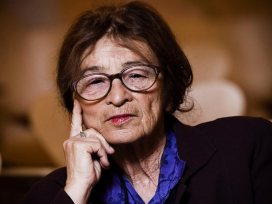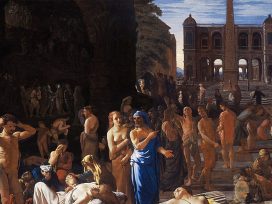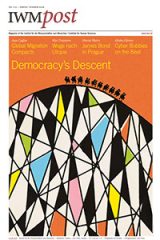

In collaboration with
Institute for Human Sciences
The Institute for Human Sciences / Institut für die Wissenschaften vom Menschen (IWM) is an independent institute for advanced study in the humanities and social sciences. Since its foundation in 1982, it has hosted more than 1500 scholars, journalists and translators from all over the world. Many of the Institute’s Permanent and Visiting Fellows are regular contributors to Eurozine or its focal points The World in Pieces and Ukraine in European Dialogue (see below).
Website: www.iwm.at
X (formerly known as Twitter): https://x.com/iwm_vienna
Youtube: https://www.youtube.com/channel/UCIwFQ_iRX8w8D0NKJo41Ihw

Articles

Paradox Europa
Opening lecture, Vienna Humanities Festival 2019
Ágnes Heller transformed a troubled life: ‘I lived through terrible things. But I had to understand them. […] Philosophers do not despair.’ Shalini Randeria and Ludger Hagedorn honour her legacy on her birthday.

In moments of crisis, reflecting on loss can be especially hard. Philosopher Krzysztof Michalski’s meditation on an unexpected death lends gravitas to universal questions of belief, awareness and fear in times of transition.

Sensationalism has focused on fistfights over toilet rolls, but the real story is the withdrawal of democratic oversight, and how little public resistance there is to the declaration of martial law. Power granted is power conceded; and power relinquished is power reclaimed with difficulty.

Of viruses and men
The dangerous pandemic in the social sciences
COVID-19 found societies not only unprepared but also unaware. Koray Caliskan and Donald MacKenzie ask why social sciences have taken so little interest in pathogens. In comparing humans and viruses, they reveal the risks of an overly anthropocentric focus. Perhaps it’s time to rewrite the books?
Focal points

Inspired by a lecture that Clifford Geertz delivered in 1995 at the Institute for Human Sciences in Vienna, this focal point engages with ‘deep diversity’, ‘a sense of dispersion, of particularity, of complexity and of uncenteredness’ rather than unified world order. It follows the launch of a research programme of the same name at the institute in January 2023.

Post-revolutionary Ukrainian society displays a unique mix of hope, enthusiasm, social creativity, collective trauma of war, radicalism and disillusionment. With the Maidan becoming history, the focal point ‘Ukraine in European Dialogue’ explores the new challenges facing the young democracy, its place in Europe, and the lessons it might offer for the future of the European project.
Projects and publications

